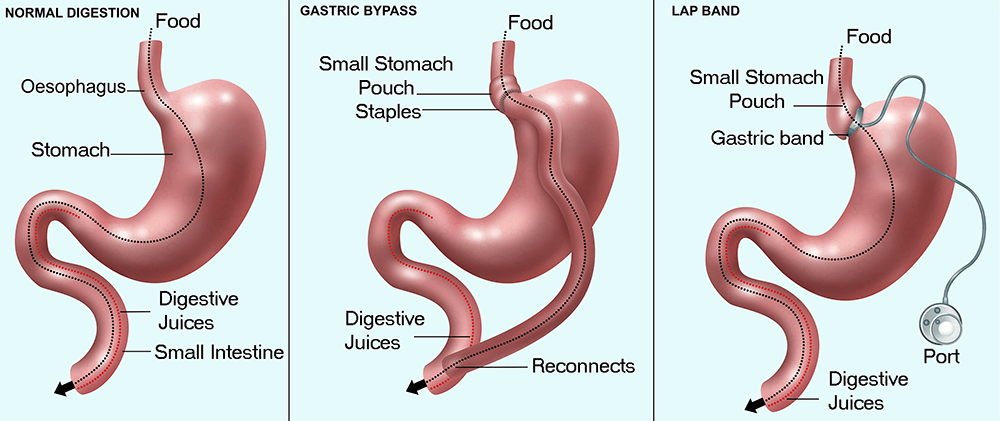Guide to bariatric surgery
Key facts
- Bariatric surgery includes a range of surgical procedures used for weight loss.
- The surgery generally involves making the stomach smaller, which makes you feel full after eating a small amount.
- Lap band, gastric bypass and gastric sleeve are common types of bariatric surgery.
- The choice of surgery depends on your weight loss needs and general health.
- After surgery, you will need to follow a special diet, take vitamins and slowly increase your physical activity.
What is bariatric surgery?
Bariatric surgery includes a range of surgical procedures used for weight loss.
Bariatric surgery affects the stomach and how food is digested. It is designed to make the stomach much smaller, which causes you to feel full after eating only a small amount of food.
What are the types of bariatric surgery?
The most common types of bariatric surgery in Australia are:
- gastric bypass
- gastric sleeve surgery (also known as sleeve gastrectomy)
Lap band surgery (also called gastric banding) is another option, however, it's less commonly recommended in Australia.
These surgeries are usually performed as a minimally invasive keyhole (laparoscopic) procedure, via several small incisions in the abdomen. Sometimes, open surgery with a larger incision is needed.
In a gastric bypass, a small stomach pouch is created by stapling. This is joined directly to the small intestine. Food bypasses most of the stomach and less calories are absorbed.
In gastric sleeve surgery, most of the stomach is removed.
In lap band surgery, an adjustable ring is placed around the top part of the stomach. This creates a very small pouch, so food remains in the top part of the stomach for longer.

What are the benefits of bariatric surgery?
There are many benefits of bariatric surgery, most of which relate to better management of obesity. Managing obesity is likely to:
- improve diabetes management
- lower blood pressure
- improve your quality of life
- improved your heart health
When might I consider bariatric surgery?
You may consider bariatric surgery after trying alternative ways to lose weight and speaking with your doctor.
Bariatric surgery is usually offered to people with a body mass index over 40 or people with a body mass index over 35 who have other serious health problems such as diabetes or heart disease.
Smoking affects your recovery after surgery and can increase your chance of experiencing complications. If you are a smoker, it's strongly recommended to quit at least 6 weeks before you have bariatric surgery.
Which type of bariatric surgery is right for me?
Many factors will determine which type of surgery is most suitable for you, including your BMI and your general health.
Your doctor will perform a detailed assessment and discuss with you the benefits and risks of each procedure.
What are the risks of bariatric surgery?
Every operation has risks. For example, there's a chance you might lose a lot of blood during surgery, or develop an infection afterwards.
Some types of bariatric surgery also pose a risk of vitamin deficiencies due to changes in your food intake and the anatomy of your gut after surgery.
Ask your doctor or surgeon about the likely risks in your situation and how you can minimise them.
What can I expect after bariatric surgery?
After the surgery, you will start introducing liquid foods only. Over the next few weeks, you will change to pureed food, then solid food. Your meals will be much smaller, and you may have to stop drinking with meals due to your stomach's smaller size.
Most people find that they need to make significant lifestyle changes after bariatric surgery to lose weight and keep it off. This may involve following dietary guidelines and taking vitamins or supplements as recommended by your doctor. Your weight loss program will also involve increased physical activity. You may be referred to a dietitian who can give you tailored advice on your diet and lifestyle.
In some cases, people will initially lose weight, but then their body becomes used to the changes made during the surgery and they regain some of the weight. To maintain weight loss in the long term, it's important to follow your healthcare team's advice and discuss any concerns.
You should see your doctor for regular health checks and blood tests for the rest of your life following surgery. If you take medicines, they may also need to be adjusted after surgery.
What are the alternatives to bariatric surgery?
Alternatives strategies to bariatric surgery for weight loss include:
- changing what you eat and drink
- increasing physical activity
- some medicines, under your doctor's guidance
Speak with your doctor if you have concerns about your weight.
Resources and support
Speak to your doctor if you have any questions about bariatric surgery.
You can also call the healthdirect helpline on 1800 022 222 (known as NURSE-ON-CALL in Victoria). A registered nurse is available 24 hours a day, 7 days a week.
The Australian dietary guidelines can help you with healthy eating tips before surgery and after once you are back to a normal diet.
For help to quit smoking call Quitline on 13 7848 (13QUIT). Hours of service may vary between states and territories, you can check the website for details or request a call back.
Do you prefer to read in languages other than English?
You can also find information on smoking cessation and healthy eating on the Health Translations or Multicultural Health Communication Service websites for resources in languages other than English.
Looking for information for Aboriginal and/or Torres Strait Islander people?
Aboriginal Quitline is staffed by Aboriginal counsellors. You can call them on 13 7848 if you need help to quit smoking.
Learn more here about the development and quality assurance of healthdirect content.
Last reviewed: February 2024


















